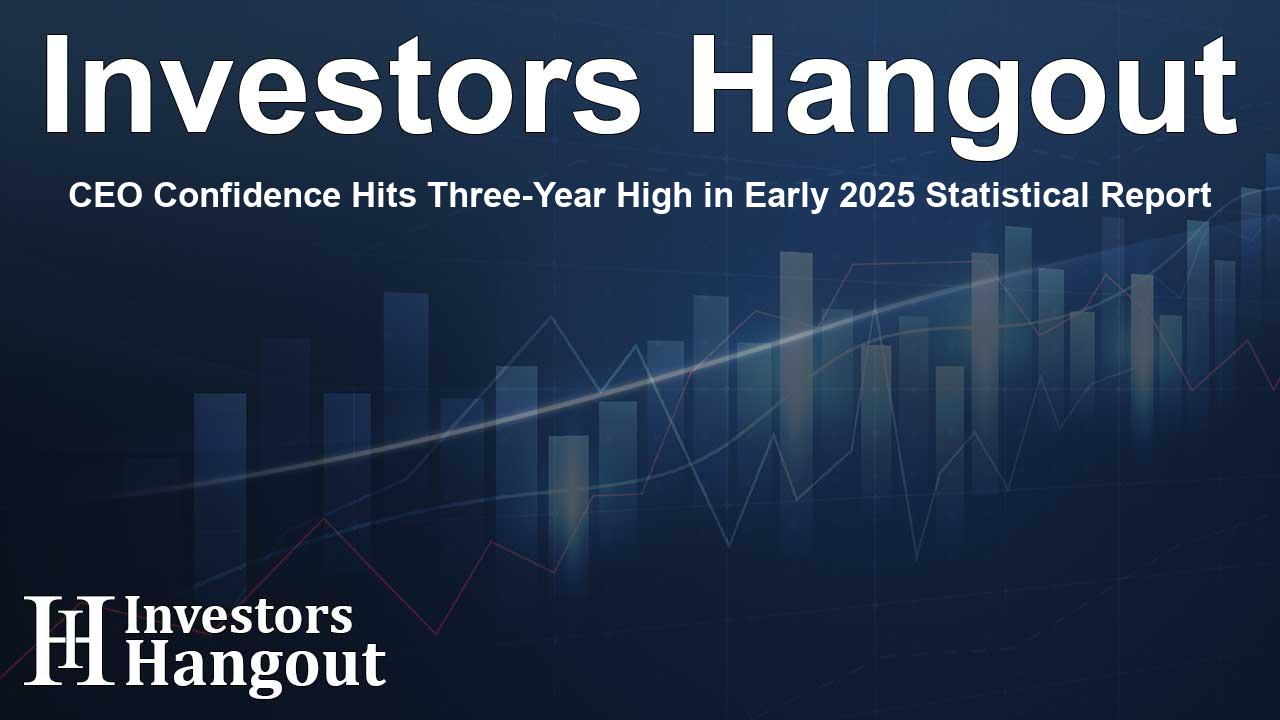CEO Confidence Hits Three-Year High in Early 2025 Statistical Report

CEO Confidence Sees Remarkable Surge in Early 2025
From cautious optimism to confident optimism
The impressive Measure of CEO Confidence in collaboration with The Business Council recorded a nine-point increase in the first quarter of 2025, reaching a notable level of 60, the highest seen in three years. This significant rise indicates that CEOs have transitioned from the cautious sentiments experienced in the previous year to a more confident perspective. A reading above 50 demonstrates a predominantly positive outlook among CEOs regarding current and future economic conditions.
Significant Findings from the Q1 Survey
This quarterly survey was based on insights from 134 CEOs who participated in a study conducted in the weeks leading to mid-February. The findings revealed a clear improvement in CEO optimism regarding their industries as well as overall economic environments.
Broad Improvement Across All Measures
According to Stephanie Guichard, Senior Economist at The Conference Board, the growth in CEO confidence was both significant and widespread. All components of the confidence measure indicated improvement, highlighting heightened optimism regarding present and future economic conditions across various sectors. CEOs expressed enthusiasm not only for the general economy but also for their specific industries.
Decreasing Concerns Over Business Risks
In a corresponding trend, CEOs reported a reduction in worries about several business risks when compared to the previous quarter. They cited less concern about factors such as regulatory uncertainty and supply chain disruptions. Interestingly, geopolitical instability remained a point of concern, with over half of the CEOs considering it a high-impact risk.
Employment Trends and Workforce Planning
As confidence grew amongst executives, workforce planning remained stable. Approximately 73% of surveyed CEOs indicated intentions to either grow or maintain their workforce sizes in the coming year. Although the percentage of those planning to expand employment diminished from 40% to 32%, a noteworthy part of CEOs expressed a desire to retain current employment levels.
Wage Growth and Work Arrangements
Moreover, a significant 71% of CEOs anticipated raising wages by 3% or more over the next year, a rise from 63% in the previous quarter. The most favored work arrangement continues to be a mix of in-office days, with more companies looking to pivot away from remote work setups.
Evaluating Current Economic Conditions
CEOs' assessments of general economic conditions turned positive with a considerable number affirming that conditions were better than six months prior. Notably, 44% felt optimistic about the economy, an increase from only 20% previously. Similarly, their perspectives on conditions within their own sectors also improved considerably.
Future Economic Expectations
Looking ahead, CEOs expressed robust expectations concerning the short-term economic outlook. Over half of the executives surveyed anticipated economic conditions would improve within the next six months, a significant jump from the previous outlook.
Capital Spending Insights
When it comes to capital spending, many CEOs are maintaining their budgets. 54% of executives indicated they had no intentions to alter their capital spending plans in the next 12 months. However, a slight increase was observed in those planning to enhance their spending, signaling potential growth investments.
About The Conference Board
The Conference Board operates as a vital non-partisan, member-driven organization founded with a focus on delivering trusted insights to guide businesses forward. The entity maintains its 501 (c) (3) tax-exempt status in the United States.
About The Business Council
The Business Council composes itself as a key forum for CEOs of the world's largest corporations to discuss pressing issues impacting various industries. Their meetings foster collaborative learning through discussions of opportunities and challenges met by businesses today.
Frequently Asked Questions
What does the increase in CEO confidence indicate?
The increase indicates a shift from cautious to confident optimism among CEOs regarding current and future economic conditions.
How many CEOs participated in the Q1 survey?
A total of 134 CEOs participated in the quarterly survey conducted in early 2025.
What are current wage expectations?
The majority of CEOs plan to implement wage increases of 3% or more in the coming year.
What are CEOs' current perspectives on employment?
Most CEOs plan to maintain their workforce sizes, with a portion considering expansion while some expect reductions.
How do CEOs view business risks moving forward?
There is a noticeable decrease in concerns about various business risks, though geopolitical instability remains significant for many.
About The Author
Contact Ryan Hughes privately here. Or send an email with ATTN: Ryan Hughes as the subject to contact@investorshangout.com.
About Investors Hangout
Investors Hangout is a leading online stock forum for financial discussion and learning, offering a wide range of free tools and resources. It draws in traders of all levels, who exchange market knowledge, investigate trading tactics, and keep an eye on industry developments in real time. Featuring financial articles, stock message boards, quotes, charts, company profiles, and live news updates. Through cooperative learning and a wealth of informational resources, it helps users from novices creating their first portfolios to experts honing their techniques. Join Investors Hangout today: https://investorshangout.com/
The content of this article is based on factual, publicly available information and does not represent legal, financial, or investment advice. Investors Hangout does not offer financial advice, and the author is not a licensed financial advisor. Consult a qualified advisor before making any financial or investment decisions based on this article. This article should not be considered advice to purchase, sell, or hold any securities or other investments. If any of the material provided here is inaccurate, please contact us for corrections.
